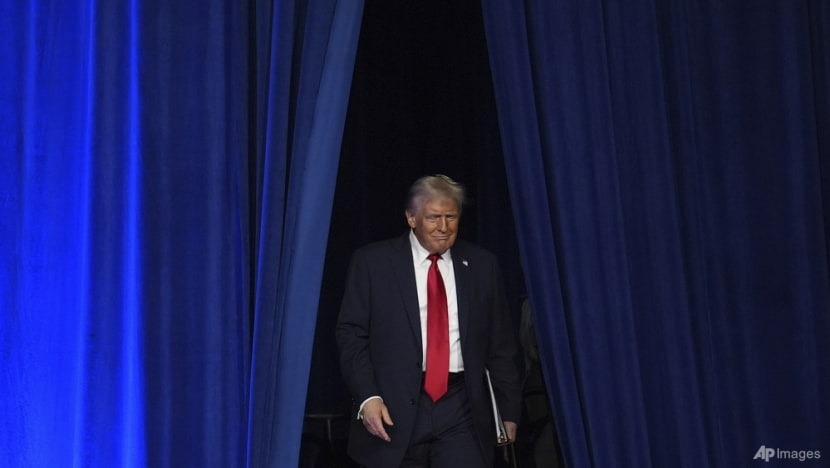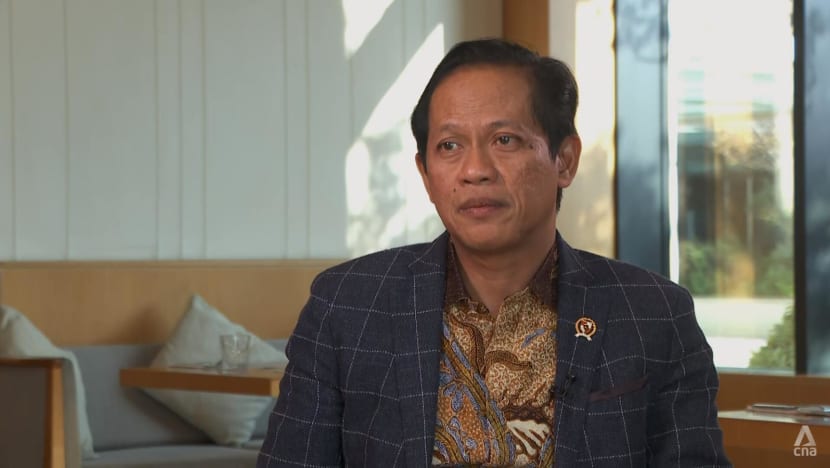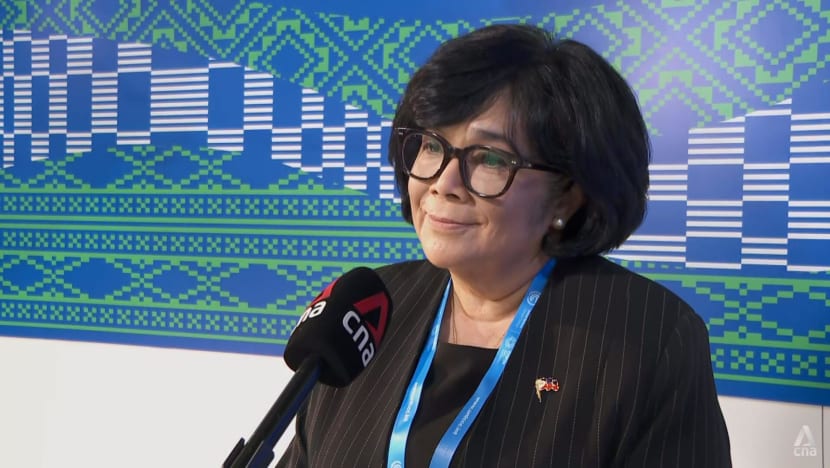‘Bad for the world’: Southeast Asia environment leaders wary about lack of US climate leadership under Trump
Once President Donald Trump retakes office in the United States, there is expectation that the country will withdraw from important climate change agreements and frameworks, a situation that Southeast Asian governments will need to manage carefully, experts and ministers told CNA at COP29.

People walk with the Baku Olympic Stadium in the background during the COP29 UN Climate Summit on Nov 20, 2024, in Baku, Azerbaijan. (Photo: AP/Peter Dejong)

This audio is generated by an AI tool.
BAKU, Azerbaijan: Southeast Asian governments will need to press on with ambitious climate change actions with or without the United States, the region’s top environment officials told CNA at the ongoing United Nations (UN) climate talks in Baku.
Amid broad fears of a likely retreat of the US from a leadership role in global climate talks with the return of president-elect Donald Trump, officials said that while the situation was concerning, global momentum for action to slow the warming of the planet remained.
Mr Trump was elected the 47th president of the US on Nov 6, beating Vice-President Kamala Harris. He will be inaugurated in January next year.
“The shadow of the election results in the US is looming in the background, but at the end of the day, we have to move on,” Mr Nik Nazmi bin Nik Ahmad, Malaysia’s Minister of Natural Resources and Environmental Sustainability, told CNA.
“Elections come and go, and I think it only highlights the importance of global cooperation to deal with something that is pertinent, like climate change. And so we hope that there will be an increase in momentum,” he added.
The 2024 UN Conference of Parties (COP29) - which is set to conclude on Friday (Nov 22) - has been primarily focused on trying to deliver new global financial commitments to developing and climate-vulnerable nations. Among those are several countries in Southeast Asia.
They have called for more than US$1 trillion annually by 2030, to replace the current yearly funding pledge from developed nations of US$100 billion. Parties have yet to determine a final workable figure nor decide who would be responsible for providing the finances.
Singapore, for one, has pledged to match every dollar up to US$500 million for green and transition projects in Asia, as part of the nation’s commitment to provide climate financing solutions in the region.

But the re-election of Mr Trump to the White House has upended the talks and potentially throttled what might be possible both in Baku and going forward in terms of collective action and raising huge amounts of climate financing.
Mr Trump has previously called climate change a hoax and a scam. He has withdrawn the United States from the Paris Agreement before when he first became president in 2017, and has pledged to do the same this time as well.
The incoming president’s pick to lead the Department of Energy - oil and gas industry executive Chris Wright - has also attracted criticism from environmental advocates.
Mr Trump’s pledge to withdraw the US from the Paris Agreement is expected to destabilise the United Nations process and will have knock-on effects to other countries. At COP29, Argentina also withdrew its ministerial negotiating team under the direction of President Javier Milei, a prominent Trump ally.
Whether the South American country will participate in future climate talks or also withdraw from the Paris Agreement remains unclear.
As governments of the Global South - countries primarily in Africa, Latin America, Asia, and Oceania often characterised as developing - push for a climate financing commitment, difficulties appear to loom if future negotiations need to take place without American leadership or major inputs from the world’s biggest economy.

“We heard that the US might withdraw from the (Paris) Agreement. If it happens, it will be bad for the world climate community. This is a worry,” said Dr Ching Thoo Ki, the secretary-general of Malaysia’s Ministry Of Natural Resources And Environmental Sustainability.
“The Global North has to be fair to assist the Global South in combating climate change.
“Put aside all the geopolitical issues, focus on what is on the table now, and this is climate change. The glaciers are melting. Sea levels are rising. So it's happening,” he said.
The Philippines is a leading player in generating more finances for a Loss and Damage Fund for countries bearing the brunt of climate impacts. It is currently hosting the fund’s board.
Ms Maria Antonia Yulo-Loyzaga, Secretary of Environment and Natural Resources, told CNA that while the US is a “very important country in terms of reaching our climate goals”, the Philippines had to be pragmatic going forward.
“The general feeling, I think, for the Philippines is that we march on,” she said.
“Of course, there are geopolitical, geostrategic considerations to every decision that we make, but we know how vulnerable we are, and therefore our paths will basically stay on track.”
Indonesia’s new minister for the environment, Mr Hanif Faisol Nurofiq, would not be drawn directly on the impact of Mr Trump’s re-election but echoed general concerns about a lack of cooperation and progress in climate diplomacy in the current political climate.
“Our hope is that with the opportunity of COP29, all countries will open themselves up to take clear, realistic actions that can be carried out together. If all countries can work together, then it will be easier to achieve results that can be agreed globally,” he said.
“If we get too absorbed into endless discussion and continue to build and emit greenhouse gases, we will get nothing but just discussions that have no end.”

REGIONAL MANIFESTATIONS
Under the leadership of outgoing US President Joe Biden, production of oil and gas has already reached record highs. And Mr Trump has promised to further expand the domestic production of fossil fuels and deregulate the energy sector.
The Trump administration’s next moves in the energy space could have flow-through impacts on Southeast Asia, which is at a “crossroads” right now between energy sustainability, security and affordability.
Mr Gerry Arances, the executive director of the Center for Energy Ecology and Development, explained that it would embolden further Japanese investments into liquified natural gas (LNG), entrenching the fuel into energy mixes throughout the region for decades to come.
Japan has been both a major investor in the US LNG sector and is pursuing power generating agreements and projects across Southeast Asia.
Overall, Japanese companies are involved in more than 30 gas and LNG-related projects throughout the region, including power plants and terminals in Vietnam and the Philippines.
Last year, Japan resold more LNG overseas than it imported from each of its largest gas trading partners, according to the Institute for Energy Economics and Financial Analysis (IEEFA).
“Southeast Asian governments need to be cautious on gas dependency for the region,” Mr Arances said.
“The economic and investment strategy of Japan really would create a lot of pressure for domestic governments, because there's a lot of trade offs with investments and trade.”
Experts told CNA there is a leadership chasm emerging in the climate space that could be filled by China. And the extent to which Beijing is willing to step into a more prominent role in terms of global climate governance has been a central theme in Baku.
“I think leadership will have to come from somewhere else,” Mr Arances said.
Chinese officials at COP29 said that the country is willing to do so but will not agree to making mandatory contributions to future climate finance.
Many developed countries want to include China, Russia, Saudi Arabia, among others, in a broader group of donor nations. But the head of China’s delegation Mr Zhao Yingmin was strident in his remarks at the summit that rich nations paying for climate financing is not a gift or charity, but a duty.
There are regional implications for Southeast Asia. Mr Arances said that China’s renewable energy industry gives it a “comparative competitive advantage” that could be further emboldened by the US taking a backward step.
“They're leading the charge globally. We hope that China will actually use its renewable energy advantage as well as its financial resources. And that's a decision for Southeast Asian governments on whether to tap that,” he said.
“Now that you have a climate denier again in the White House, China should be bold enough to actually occupy that space for the region.”

ONE COUNTRY CAN’T CHANGE THE WORLD
Argentina’s abandonment of COP29 was emblematic of general unease among parties that some countries may use the excuse of America’s withdrawal from the multilateral process to downsize their own levels of ambition or slow investments in clean technologies.
But Ms Lindy Fursman - who is the director of Climate and Energy Policy at the Tony Blair Institute for Global Change - says the US alone cannot derail the momentum of global systematic change, especially in the energy sector.
“The reality is that a change of direction in one country's policies won't change or alter the transition that we're seeing to renewables,” she said.
“We know in the past year, for example, that investment in renewables was twice that in fossil fuels, and it also won't alter the appetite of developing economies for sustainable growth.”
She added that unlocking private financing - beyond the money from state coffers - would be key to achieving climate spending shortfalls.
“There is certainly a wall of capital there waiting to be deployed if we've got the right signals for it,” Ms Fursman said.
Some experts said that governments and communities eager to push ahead with cooperative action could take heart from knowing what happened in 2016, the last time Mr Trump took office.
Related:
There is a greater sense of urgency now compared to eight years ago. Climate scientists say this decade is crucial for keeping global temperature rise in check; currently the planet is on track to be 3.1 degrees Celsius warmer by the end of the century, according to the latest United Nations Environment Programme (UNEP) Emissions Gap report.
At the same time, the conversations and actions around decarbonising economies are far more advanced than they were at that time, despite the “problematic” moves the US is expected to make soon.
“We've been here before. We know what that playbook is and what we saw at that time is that the private sector continued and committed towards working towards the goals in the Paris Agreement,” said Ms Champa Patel, the executive director for governments and policy at Climate Group, an international non-profit specialising in climate and energy.
“Of course, we need US leadership on these issues. They're one of the biggest emitters in the world. But at the same time, there are lots of actors within the US who are going to mobilise quite ambitious action,” she said.
It is a sentiment shared by Mr Franceso La Camera, the director-general of the International Renewable Energy Agency.
“The US administration, as with other administrations, believes in the free market,” he told CNA.
“The situation is quite different than eight years ago. There were some uncertainties. Now it's so evident. All the numbers are clear. Renewables are the most competitive way to produce power,” he said.





















